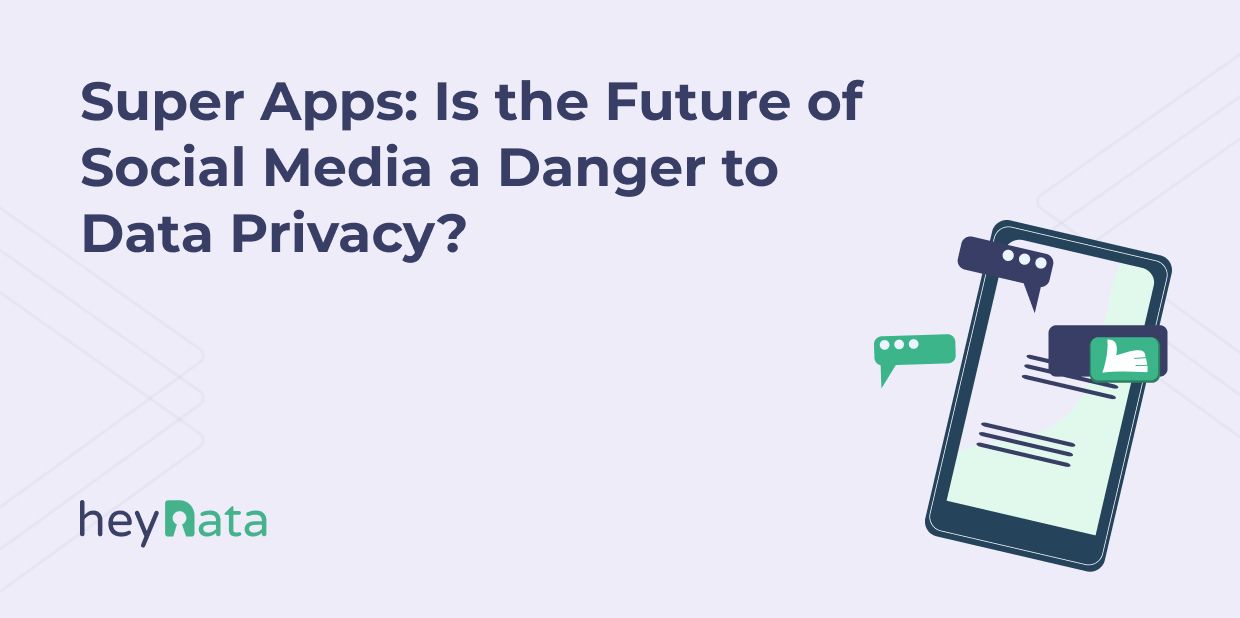
Super Apps: Is the Future of Social Media a Danger to Data Privacy?

'%3e%3cpath%20d='M26.6667%2020.022L30%2023.3553V26.6886H21.6667V36.6886L20%2038.3553L18.3333%2036.6886V26.6886H10V23.3553L13.3333%2020.022V8.35531H11.6667V5.02197H28.3333V8.35531H26.6667V20.022Z'%20fill='%230AA971'/%3e%3c/g%3e%3c/svg%3e) What's it all about?
What's it all about?
Discover why social media platforms are evolving into Super Apps and how they impact data privacy.
In today's tech-driven world, major social media giants worldwide are poised to gradually transform from simple apps that do one thing to a new era of all-in-one platforms known as super apps – offering tons of services within a single app. The goal is to make the lives of end users and businesses easier, save time, and dominate the market.
Originally intended for socializing and entertainment, platforms like Meta (Instagram, Facebook, Threads, WhatsApp), TikTok, and even Twitter (known as X today) are already starting to evolve into super apps, blurring the lines between social networks and multifunctional platforms. This shift is set to reshape our digital landscape and redefine how we interact with these platforms.
Learn more: Threads: The Emerging Social Network in Focus - Data Protection and Challenges in the EU
While this shift towards super apps brings promising possibilities, it also raises concerns about data and privacy. What exactly are super apps, and how can businesses effectively balance convenience with data privacy?
Table of Contents:
What are Super Apps?
The term “Super App” originated in China through WeChat, a Chinese app developed by Tencent in 2011. Boasting over 1 billion monthly active users, WeChat offers messaging, payments, social media, ecommerce, games, and transportation services – all within one platform, making it a massive success. Other popular Chinese super apps include Alipay, a financial management service and Meituan-Dianping, a food delivery service.
As super apps gained popularity in China, western countries have caught on and started creating their own all-in-one solutions to cater to their customers' needs. Amazon Prime, Uber Eats, and Grubhub are examples of Western super apps offering various services in addition to their primary offerings.
Social media platforms like WhatsApp, which is also part of Meta, recently introduced a directory feature in South America, enabling users to find local businesses easily, Facebook released its standalone Gaming app for users to play instant games and take part in gaming groups, which came to an end 2 years after its launch, while Twitter, now X has recently announced its goal of transforming into a platform centered on audio, video, messaging, payments/banking powered by AI.
Learn more: Safeguarding Data Protection and Compliance when Utilizing AI
Why are Super Apps important?
What's driving the shift away from single-function apps and the rise of super apps?
The transformation towards super apps is driven by the staggering statistics in the mobile app industry. Let’s look at the Key Mobile App Statistics for 2023:
- There are approximately 6.3 billion smartphone users across the world
- The average smartphone owner uses 10 apps per day and 30 apps each month.
- 49% of people open an app 11+ times each day.
- 21% of millennials open an app 50+ times per day.
It's evident that mobile apps have become an integral part of life, making 2023 a significant year for the mobile app industry.
Super App and Data Privacy Concerns
While super apps provide convenience and efficiency for users, introducing new apps that promise a range of services doesn't always. For instance, just a week after the Thread's peak usage on July 7, average time spent on the app each day fell from 21 minutes to six minutes among U.S. users. Time spent on Twitter also took a slight knock over this period, falling by 4.3% (at least on Android), according to Yahoo Finance.
Other than that, super app also creates a large repository of sensitive user data, making them an attractive target for cybercriminals. Data breaches have become increasingly frequent in recent times, as well-known social platforms like Yahoo, Facebook, and LinkedIn have all experienced cyber attacks – resulting in the leak of user data, such as names, addresses, passwords, and phone numbers.
As super apps continue to grow and integrate third-party services, they face new security challenges. Ongoing testing and monitoring are crucial to address security risks and promptly detect vulnerabilities and threats. Ensuring data privacy and implementing robust security measures are essential to protect users from the devastating consequences of data breaches.
Conclusion
The rise of super apps is a clear reflection of our fast-paced digital world, where users’ convenience and seamless interactions are highly valued. Though the possibilities are endless, it is essential for businesses to prioritize the protection of personal data and user privacy. The success of super apps depends on finding the perfect balance between offering diverse functionalities and ensuring robust data security, creating a safe and enjoyable experience for users everywhere.
Compliance with GDPR and navigating through complex data protection laws can be quite the challenge for businesses operating in the EU. By utilizing heyData as an External Data Protection Officer (DPO) solution, businesses can save time, cut costs, and receive professional guidance on data protection matters, and stay GDPR compliant.


